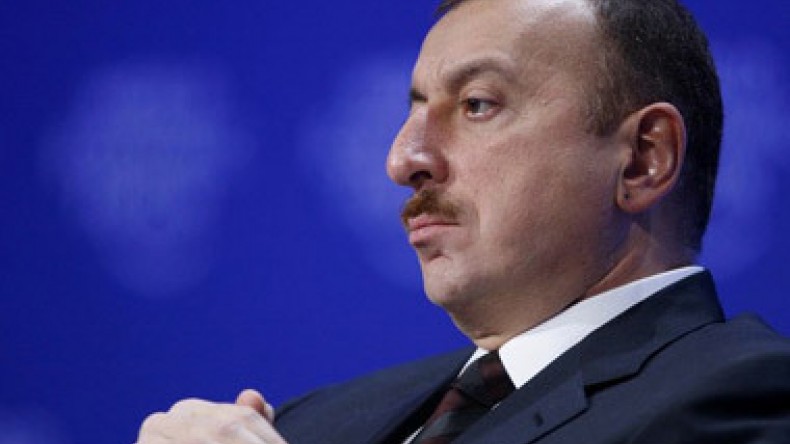
Bloomberg: Aliyev seeking third term in office, has enough petrodollars to suppress opposition
Azerbaijani ruling another secular Muslim dynasty is clinging to its fifth decade in power amid increasing calls for greater freedom and less corruption, the article in Bloomberg reads. Azerbaijan President Ilham Aliyev has strong U.S. relations and a steady stream of oil cash to temper the opposition.
“Aliyev is seeking to extend his family’s rule in an Oct. 9 election, his third since succeeding his father in a disputed vote a decade ago. Bordering Turkey and Iran, the former Soviet province of 9 million mostly Shiite Muslims is what the U.S. ambassador calls a “steadfast” ally, handling about 30 percent of all non-military NATO shipments into Afghanistan and operating the only non-Russian outlet for Caspian oil flows to world markets,” the agency writes.
According to the article, with the opposition united for the first time behind a single challenger, Camil Hasanli, thousands of people rallied in the capital Baku on Sept. 22 to demand Aliyev’s resignation. That was the largest demonstration against the government since 2005. Kate Mallinson, senior analyst at London-based political risk evaluator GPW thins that the potential for contagion from the Middle East can’t be ruled out, as there are a lot of disgruntled people on the street because there aren’t opportunities, but rising incomes for the nascent middle class in the short term mean that any regime change is unlikely.
Buoyed by the third-largest oil reserves in the former Soviet Union and $40 billion of investment from BP Plc (BP/) and its partners, Aliyev is betting he can overcome protests and avoid the fate of other Muslim autocrats. While Aliyev has used some of the country’s oil riches to transform Baku’s concrete skyline into a glimmering metropolis, his government is still ranked by Transparency International and Reporters Without Borders as one of the most corrupt and repressive in the world.
Bloomberg also touches the offshore properties of Aliyev clan, in particular the properties in Dubai that cost $44 million.
Hasanli, the opposition candidate, was attacked with a bottle by an Aliyev loyalist for trying to bring up the report during a televised debate last month.
Anna Walker, an analyst at Control Risks, a London-based advisory group notes that, everyone is aware of the vast wealth that the presidential clan has. “Dozens of political activists, journalists, bloggers and other critics of the government have been arrested or convicted of “bogus charges” over the past 18 months,” the agency reminds with a reference to Human Rights Watch report.
It also notes that the Azeri leader won 77 percent and 87 percent of the official tally in his two electoral victories, in 2003 and 2008, which were deemed neither free nor fair by U.S. and EU observers.
According to Bloomberg, The U.S., which would like to see more democratic and free-market reforms in Azerbaijan, has other strategic interests in the region that need to be taken into account when dealing with Aliyev, according to Matthew Bryza, the U.S.’s former ambassador to Azerbaijan. According to him, the U.S. also has interests in security and economic cooperation.
Aliyev has steered a pro-Western course, forging regional alliances with Turkey and Israel while keeping at bay former imperial master Russia as well as the country’s southern neighbor Iran. “The system is reliant on a large and well-funded police force and national security services,” said Lilit Gevorgyan, senior analyst at IHS Global Insight.
“Corruption and nepotism also remain pervasive despite the official statistics on poverty reduction,” the expert said. Even as Aliyev used the country’s oil riches to slash poverty levels, youth unemployment may become a “critical issue,” the International Monetary Fund said in a report last year, estimating that about a third of the unemployed are aged 16 to 24.
The article notes that part of Aliyev’s governing strategy is to create a “cult of personality” around his father, who is hailed as the father of the nation, Global Insight’s Gevorgyan said by e-mail. “His statues and portraits have become ubiquitous,” she said.
Bryza, the former U.S. ambassador, said that although there is “dissatisfaction” among the Azeri population, and the rich are getting richer faster than they did in the past, Aliyev is genuinely popular enough to win “even the freest and fairest elections.”
Baku pensioner Mammad Afandiyev said he agrees with that assessment, but only because nobody else has the political, financial and human resources to challenge Aliyev. “Most Azeris criticize Aliyev, but there are no alternatives at the moment,” Afandiyev said, adding that he doesn’t plan to vote “because it won’t make a difference.”
Bloomberg notes that still, crude production, which accounts for more than half of the economy, has been declining since 2010 and the popularity of social networks such as Facebook Inc. (FB), with more than 1 million Azeri users, is on the rise, giving people new avenues to express their frustration.
The U.S. hopes that next week’s presidential election will be “a step” toward greater political freedom in Azerbaijan, the American Embassy in Baku said in an e-mailed statement. Aliyev’s victory “is considered virtually a foregone conclusion,” the Brussels-based International Crisis Group said. “Government officials seem mainly concerned about post-election disorder,” the agency reports.
Newsfeed
Videos






























